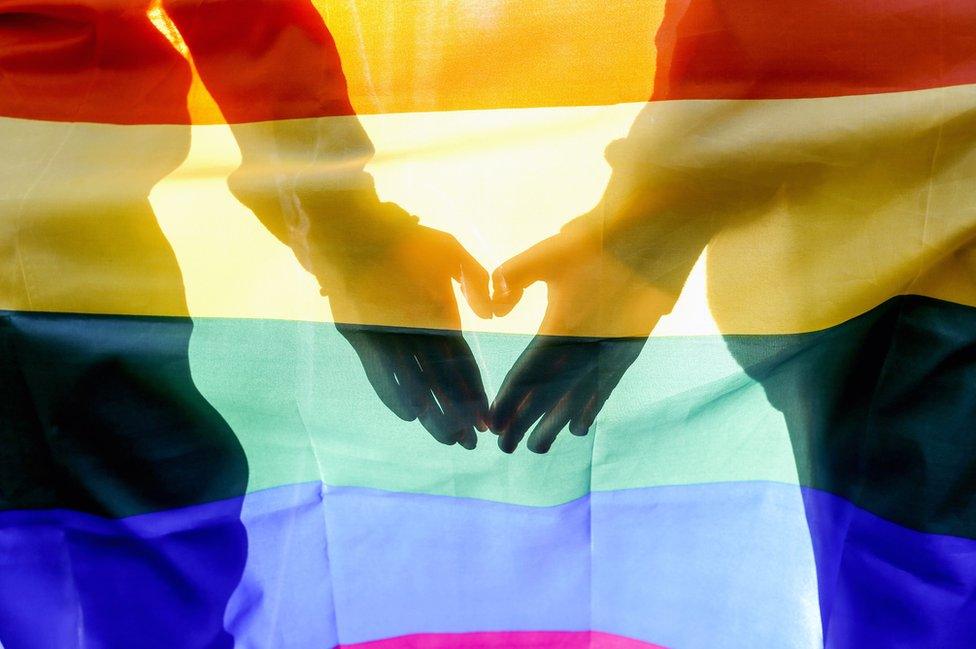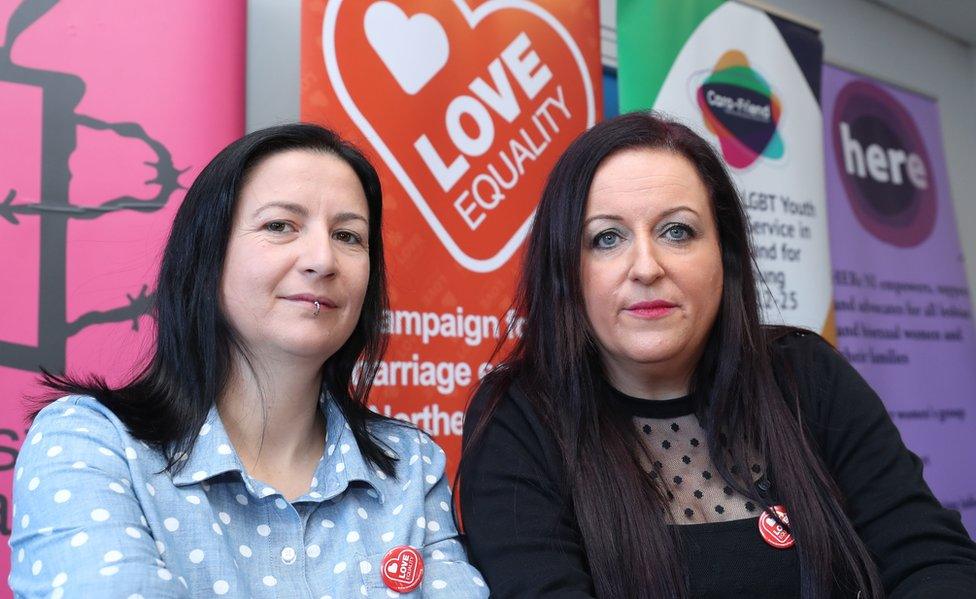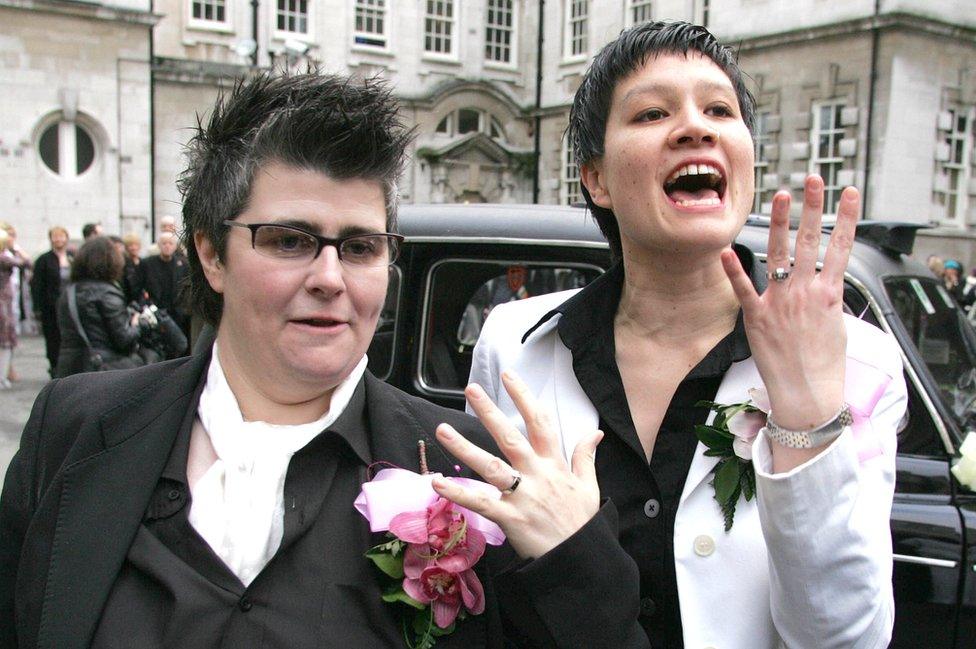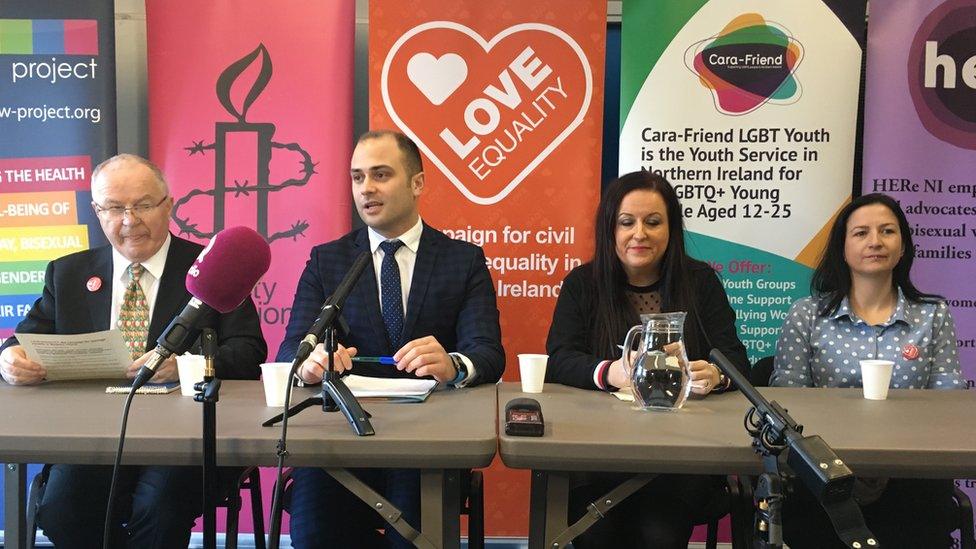Same-sex marriage: Gay couples' action on 'delay' in NI
- Published

Same-sex marriage campaigners have said they will start a legal challenge to force the government to allow gay couples in Northern Ireland to convert their civil partnerships into marriage.
The first gay marriages in Northern Ireland are expected to take place in February, after they were legalised in legislation passed by MPs in October.
The government is "working to meet" the deadline for introducing the law.
But campaigners have said it has not done enough for some gay couples.
They have said couples in civil partnerships have been left behind because under the plans they will not be able to convert their partnerships to marriage.
In England, Scotland and Wales, civil-partnered couples can convert their partnerships to marriage, external by filling in a form and paying a fee of £56.

Amanda McGurk (left) and Cara McCann want to convert their civil partnership to marriage
That will not immediately apply in Northern Ireland but the government said it intends to hold a public consultation about extending that to the region, external.
Campaigners said that means more than 1,200 couples in Northern Ireland who have civil partnerships will not be able to convert to married status.
'Government changed its mind'
Cara McCann and Amanda McGurk said they would take legal action to make sure the change is in place in January.
The same-sex couple entered a civil partnership this year and Ms McCann argued they had not been treated in the same way as gay couples who were not civil partners.
"Just a few weeks ago I sat in a room in Stormont House with government ministers and officials and was told that I could become a married woman in the new year," she added.
"Now the government has changed its mind.
"We will to go to court to ensure the government does not escape its legal obligation."

In 2005 Northern Ireland became the first place in the UK to hold civil partnership ceremonies
Ms McCann said she and her partner were effectively "locked in" to their civil partnership because they could not dissolve it to become married.
A civil partnership cannot be dissolved within its first two years in Northern Ireland - after that it can only be dissolved for at least one of these reasons:
two years of separation with the consent of the other partner to dissolve the partnership
five years of separation
unreasonable behaviour
desertion
Ms McCann said that with none of those grounds being met and with no right to convert their partnership she and Ms McGurk were not able to benefit from the legalisation of same-sex marriage.
That was creating a "hierarchy within the LGBT community", she added.
The new legislation requires the government to bring in regulations to provide for same-sex marriage by 13 January 2020.
But couples have to indicate their intention to marry 28 days before doing so, meaning the first gay weddings are expected to be held in the week of Valentine's Day.
'Delay for religious weddings'
Ms McCann and Ms McGurk are being joined in their legal action by two Christian same-sex couples.

Cara McCann (second right) and Amanda McGurk (right) have no choice but to take legal action, says their solicitor Ciaran Moynagh (second left)
Under the government's plans, same-sex couples will not be able to marry in a religious ceremony when gay marriage becomes lawful.
The government said it intended to carry out a consultation on allowing religious same-sex marriages in Northern Ireland.
"We think it is right that religious organisations, faith groups and individuals are able to give their views on same sex couples marrying in religious ceremonies, just as they did in England, Wales and Scotland," it added.
It said that meant there would be a "short delay" before such a change was introduced for religious organisations that chose to offer same-sex marriage ceremonies.
Ciaran Moynagh, the solicitor representing the couples who are taking the legal action, said the government's proposals did not deliver on its commitment to allow "equal access" to same-sex marriage for couples in Northern Ireland.
"My clients feel they have no choice but to take this action for themselves and on behalf of many others who face the prospect of continued inequality of treatment," he added.
- Published22 October 2019
